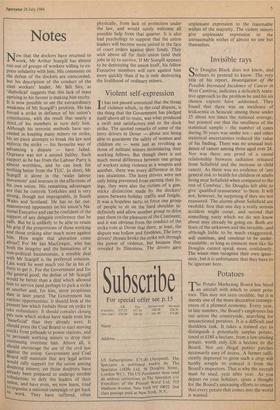Notes
Now that the dockers have returned to work, Mr Arthur Scargill has almost run out of groups of workers willing to ex- press solidarity with him. His comments on the defeat of the dockers are unrecorded, but his description of the conduct of the steel workers' leader, Mr Bill Sirs, as `diabolical' suggests that this lack of mass uprising in his favour is making him tetchy. It is now possible to see the extraordinary weakness of Mr Scargill's position. He has forced a strike in defiance of his union's constitution, with the result that nearly a third, of his members in turn defy him. Although his terrorist methods have suc- ceeded in keeping many miners on strike, his set-piece attempts to break the law and enforce the strike — his favourite way of advancing a dispute — have failed. Orgreave was not a second Saltley. Such support as he has from the Labour Party is almost worthless, and he can look for nothing better from the TUC. In short, Mr Scargill is alone in the 'wider labour movement' and insecure in the affections of his own union. His remaining advantages are that he controls Yorkshire and is very strong, though not impregnable, in South Wales and Scotland. He has so far out- manoeuvred opponents on his union's Na- tional Executive and can be confident of the support of any delegate conference that he calls. But he is unlikely to be able to retain his grip if the proportions of those working and those striking alter much more against him. How might that alteration come about? For Mr Ian MacGregor, who has both the integrity and the limitations of a non-political businessman, a sensible deal With Mr Scargill is the preferred solution. Last week he went much too far in his ef- forts to get it. For the Government and for the general good, the defeat of Mr Scargill would be better than a deal which allowed him to survive (and perhaps to pick a strike at another and, for him, more propitious date in later years). The Government has various opportunities. It should look at the present law which forbids those on strike to take redundancy. It should consider closing pits now which strikes have made even less beneficial' than they already were. It should press the Coal Board to start moving stocks from pitheads to power stations, and to persuade working miners to drop their continuing overtime ban. Above all, it should encourage the use of the civil law against the union. Government and Coal Board still maintain that any legal action would rally support for the union among doubting miners; yet those doubters have already been prepared to undergo terrible trihnlations to defy the leaders of their .unloo, and have even, we now learn, tried to organise a national campaign to get back 10 work. They have suffered, often
physically, from lack of protection under the law, and would surely welcome all possible help from that quarter. It is also bad psychology to suppose that the union leaders will become more united in the face of court orders against their funds. They wish above all for their union (and their jobs in it) to survive. If Mr Scargill appears to be destroying the union itself, his fellow Executive members will turn against him more quickly than if he is only destroying the livelihood of ordinary miners.










































 Previous page
Previous page